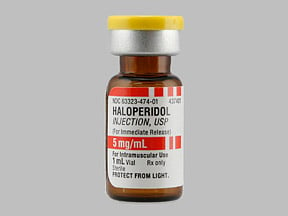
Haldol Coupons & Savings Card – Discount Prices from $1.01
Brand for: Haloperidol
My prescription
Edit
10 solutions 1ML of 5MG/ML, Haloperidol (1 Ampule)
Select pharmacy

CVS
$20.19
COUPON PRICE
Walmart
$1.01
COUPON PRICE
Walgreens
$9.90
COUPON PRICEHaldol savings card
Show this card to your pharmacist
Walmart
$1.01
BIN
ID
PCN
GRP
019876
LH6BCB400E
CHIPPO
LHX
Powered by
Related typical antipsychotics prescriptions
More prescriptions for tourette syndrome
Related typical antipsychotics prescriptions
More prescriptions for tourette syndrome
Haldol dosage forms
| Dosage | Quantity | Price from | Per unit |
|---|---|---|---|
| 10 solutions 1ML of 5MG/ML | 1 Ampule | $1.01 | $1.01 |
Haldol Warnings
The following safety information outlines critical warnings and precautions associated with the use of haloperidol injection. Please review these points carefully and discuss any concerns with your healthcare provider.
Increased Mortality in Elderly with Dementia-Related Psychosis: Individuals aged 65 and older with dementia-related psychosis are at a heightened risk of death when using medications like haloperidol injection. Therefore, it is not recommended for this population. Inform your healthcare provider if you or someone you care for has dementia before beginning treatment.
Life-Threatening Heart Rhythm Issues (QT Prolongation): Haloperidol injection may cause QT prolongation, a potentially fatal heart rhythm disorder. This risk is elevated in those with low potassium or magnesium levels, existing heart conditions, or those taking other QT-prolonging drugs. Notify your healthcare provider about all medications you are taking. Immediate medical attention is necessary if you experience symptoms like chest pain or severe lightheadedness.
Uncontrolled Body Movements: Prolonged use or high doses of haloperidol injection can lead to irreversible uncontrolled movements, especially in older adults, females, or those with Parkinson's disease or certain dementias. Report any involuntary movements to your healthcare provider immediately.
Neuroleptic Malignant Syndrome (NMS): This rare but serious condition can occur with antipsychotic medications, marked by symptoms such as high fever, muscle stiffness, and confusion. Seek urgent medical help if these symptoms arise.
Increased Fall Risk: Haloperidol injection may cause drowsiness, low blood pressure, or balance issues, raising the risk of falls. Exercise caution when standing up and consult your provider if concerns about balance arise.
Risk of Pneumonia: The use of haloperidol injection may lead to bronchopneumonia, particularly in older adults, smokers, or those with respiratory issues. Seek medical advice if you develop symptoms like fever or breathing difficulties.
Low White Blood Cell Counts: Haloperidol may reduce white blood cell counts, increasing infection risk. Regular blood tests are necessary to monitor this condition. Contact your provider if you experience signs of infection.
Pregnancy Considerations: Pregnant individuals should use haloperidol injection only if the benefits justify the potential risks to the unborn baby. Discuss with your healthcare provider if you are pregnant or planning to become pregnant.
Contraindications: Haloperidol injection should not be used in individuals with conditions such as coma, Parkinson's disease, Lewy body dementia, or any condition causing reduced brain activity, which may lead to symptoms like slowed breathing and reflexes. Consult your healthcare provider if any of these conditions apply to you.
Haldol Side Effects
When using this medication, some common side effects may occur, generally mild, but if they persist or worsen, consider consulting your healthcare provider. These include stiff or rigid muscles, tremors, trouble speaking, and other symptoms associated with parkinsonism, which can affect about 31% of users. Other side effects reported by some individuals, which should be monitored, include spasms in the muscles of the eye, loss of muscle control, restlessness, stomach pain, and headaches. These are generally less severe but should be communicated to your healthcare provider if they become bothersome. There are rare but serious side effects that warrant immediate medical attention. These include abnormal heart rhythms, characterized by symptoms such as chest pounding, shortness of breath, chest pain, and feeling faint or lightheaded. Neuroleptic malignant syndrome (NMS) is another critical condition that may present with fever, sweating, stiff muscles, confusion, and a rapid or irregular heartbeat. Additionally, be alert for signs of a severe infection, like fever, pale skin, fast heart rate, lightheadedness, and feeling unwell. Lastly, symptoms of a stroke, such as sudden numbness in the face, arms, or legs, especially on one side of the body, or sudden difficulty with speech, vision, walking, or understanding others, require urgent medical care.
Haldol Interactions
Haloperidol, commonly known as Haldol, is an antipsychotic medication used to treat various mental health conditions. It's important to be aware of potential interactions between haloperidol and other substances, as these can affect the medication's effectiveness and safety.
Medications That May Increase Haloperidol Levels:
Certain drugs can raise haloperidol concentrations in the blood, potentially leading to increased side effects. These include:
CYP3A4 Inhibitors: Medications like Ketoconazole, Itraconazole, and Ritonavir can inhibit the enzyme CYP3A4, leading to higher haloperidol levels.
CYP2D6 Inhibitors: Drugs such as Fluoxetine, paroxetine, and quinidine can inhibit CYP2D6, another enzyme involved in haloperidol metabolism.
Medications That May Decrease Haloperidol Levels:
Other substances can lower haloperidol concentrations, possibly reducing its effectiveness:
- CYP3A4 Inducers: Medications like Carbamazepine, Phenobarbital, and Rifampin can enhance the activity of CYP3A4, leading to decreased haloperidol levels.
Medications That May Prolong the QT Interval:
Haloperidol has been associated with QT interval prolongation, a measure of delayed heart repolarization that can increase the risk of serious heart arrhythmias. Combining haloperidol with other drugs that prolong the QT interval can amplify this risk. Such medications include:
Certain Antipsychotics: Examples are Chlorpromazine, Thioridazine, and Ziprasidone.
Antiarrhythmics: Medications like Amiodarone and Sotalol.
Other Drugs: Some antibiotics (e.g., Erythromycin), antidepressants (e.g., Citalopram), and certain medications used to treat nausea (e.g., Droperidol).
Other Notable Interactions:
Central Nervous System (CNS) Depressants: Combining haloperidol with alcohol, opioids, or other CNS depressants can enhance sedative effects, leading to increased drowsiness or respiratory depression.
Antihypertensive Medications: Haloperidol may lower blood pressure. When taken with medications that also reduce blood pressure, there is an increased risk of hypotension (low blood pressure), which can lead to dizziness or fainting.
Levodopa and Dopamine Agonists: Haloperidol can counteract the effects of medications used to treat Parkinson's disease, such as levodopa, potentially worsening symptoms.
Recommendations:
Always inform your healthcare provider about all medications, supplements, and over-the-counter drugs you are taking. This will help them assess potential interactions and adjust your treatment plan accordingly. Never start or stop any medication without consulting your healthcare provider, as this can affect the safety and effectiveness of your treatment.
What is Haldol mainly used for?
Haldol is mainly used to treat schizophrenia and to control symptoms of acute psychosis. It is also used to manage motor and verbal tics in people with Tourette's syndrome.
Does Haldol calm you down?
Haldol, also known as haloperidol, is an antipsychotic medication that can help calm individuals by reducing symptoms such as agitation, aggression, and severe anxiety. It is often used in the treatment of schizophrenia, acute psychosis, and for controlling tics and vocal utterances in Tourette's syndrome. However, its effects can vary from person to person, and it should be used under the guidance of a healthcare professional.
Is Haldol a strong sedative?
Haldol, also known as haloperidol, is an antipsychotic medication that can have sedative effects. It is not primarily classified as a sedative, but it can cause sedation as a side effect, especially at higher doses. It is often used to manage symptoms of psychosis and agitation.
How does Haldol make a person feel?
Haldol, or haloperidol, is an antipsychotic medication that can affect individuals differently. Generally, it may help reduce symptoms of psychosis such as hallucinations and delusions, leading to a calmer and more stable mood. Some people might experience side effects such as drowsiness, restlessness, or muscle stiffness. It's important for individuals to discuss their specific reactions and any concerns with their healthcare provider.
What is the most common side effect of Haldol?
The most common side effect of Haldol (haloperidol) is extrapyramidal symptoms, which include movement disorders such as tremors, rigidity, and bradykinesia.
